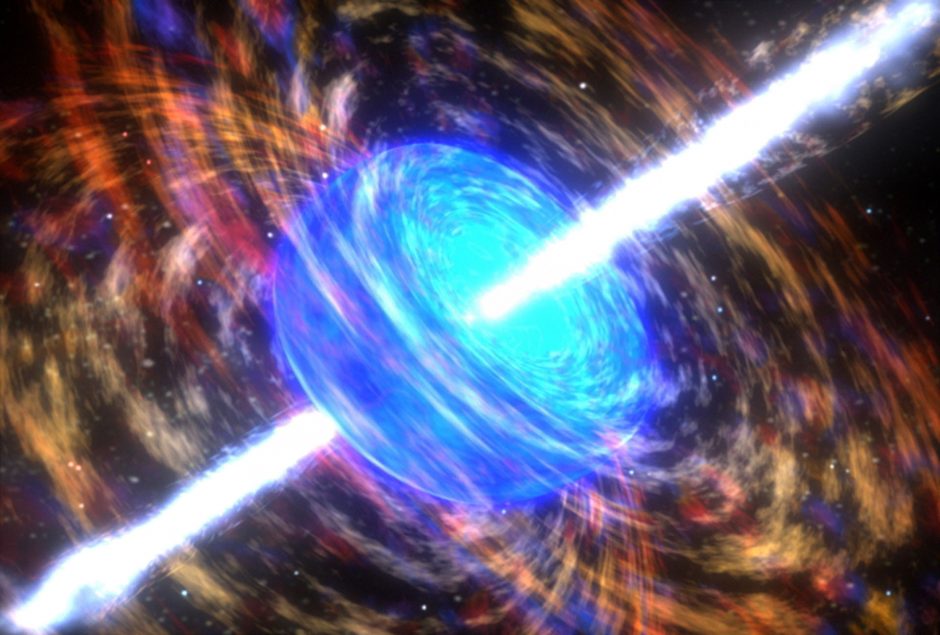Skygazers
UF physicists and astrophysicists are making waves.

UF’s Departments of Physics and Astronomy are indeed working on a cosmic scale. The past two years have been remarkable times of international collaboration and interdisciplinary innovation. On Sept. 14, 2015, the Laser Interferometer Gravitational-Wave Observatory (LIGO) heard its first “chirp” of gravitational waves from colliding black holes. The discovery, confirmed and announced six months later, was enabled by the UF LIGO team’s detection algorithm and the “input optics” for the interferometer. LIGO, currently in its “Advanced LIGO” stage, has had heavy involvement from UF since its inception two decades ago. Now, its demonstration of the viability of gravitational-wave astronomy to learn about the universe has launched a new era of “multi-messenger” astrophysics. Recently, on Aug. 14 and 17, LIGO and its European counterpart, Virgo, detected another chirp from a black hole merger and one from a kilonova — a neutron-star merger. The latter created a cosmic smorgasbord of signals that were picked up by telescopes and interferometers around the world, as well as satellites. UF Astronomy helped confirm the discovery through its FLAMINGOS2 infrared spectrograph.
Although these incredible observations were of events that occurred millions of years ago, UF Astronomy also went out in force to watch a contemporary cosmic event: 2017’s total solar eclipse, which occurred Aug. 21, and was the first eclipse visible across most of the contiguous U.S. in almost 100 years. Francisco Reyes, director of the UF Teaching Observatory, was part of a team stationed at 28 points along the path of totality to measure how atmospheric deionization due to the eclipse’s obscuration affects the galactic radio background. On the UF campus, which unfortunately was not in the path of totality, about 3,000 people gathered at the Teaching Observatory to witness the eclipse. Professors in religion, zoology, and psychology discussed the eclipse as a point of inquiry in their respective fields. People paused their daily business to share eclipse glasses on Turlington Plaza.
Enhancing the Undergraduate Experience
New program aims to take undergraduate career preparedness to the next level.
The term “experiential education” is bandied around higher education quite a bit these days and begs the question, “Isn’t all education experiential?” Yes, of course … and no. A new program launched this fall, Beyond120, seeks to expand what experiential education means in the UF College of Liberal Arts and Sciences. As the name implies, the idea behind Beyond120 is to exceed the requirement of 120 credits for a baccalaureate degree — not literally, but in a larger sense, making learning experiences outside of the classroom an integral part of the overall undergraduate experience.
Originally conceived by Liberal Arts and Sciences Dean Dave Richardson and Academic Advising Dean Joe Spillane, the program focuses on four major areas: internships, international exchange programs, career readiness and professional development, and alumni mentoring.
“Alumni participation will be critical to the program’s success,” says Richardson, “not just for the obvious networking, mentoring, and internship opportunities, but also for helping to build a robust program for years to come. Building and funding Beyond120 is one of our main campaign goals over the next five years.”
Although the program just launched at the beginning of the Fall semester, nine alumni businesses already have partnered to provide undergraduate internships, such as Infinite Energy in Gainesville started by DARIN COOK ’87.
Through structured classes and seminars, Beyond120 will offer opportunities for students to fill in gaps including speaking, writing, numerical literacy, and technical literacy. “It’s very important to us that our students leave UF knowing how to adapt quickly and nimbly to changing technologies,” says Richardson. Encouraging students to be involved with campus organizations and volunteer for off-campus nonprofits also is an aspect of the program. “We want to provide as much preparation as we can for our students to enter meaningful careers,” says Spillane.
Liberal Arts and Sciences has international exchange programs with five universities in the United Kingdom and Australia. Through the exchange program, students pay only what their UF tuition would normally be with all financial aid, fellowships and scholarships being applicable. Associate Dean Brian Harfe, who coordinates the exchange program, says, “We specifically chose world-class universities in English-speaking countries because we wanted to provide exchange opportunities for all our majors, including science majors who have traditionally had limited options to go abroad. During their time abroad, students are exposed to divergent viewpoints, experience a different culture, and make lifelong friends. The experience is life-changing for the students that go on these exchanges.”
Though the program just launched this fall, Spillane says that students are enthusiastic. “The curricular pieces of the program are under development, and will be handled by an expanded advising office. Some early pieces, like a yearlong Sophomore Leadership Seminar, have already brought Liberal Arts and Sciences alumni together with undergraduates eager to learn from their experiences. Watching students and alumni interact in the seminar setting has been an eye-opener,” says Spillane, “and has encouraged as to keep mentoring close to the heart of the journey Beyond120.”
“Ultimately, we want Beyond120 to encompass more than the idea of experiential education,” says Richardson, “but instead help students combine self-discovery, broadening of career option knowledge, and true professional development in a time that demands more knowledge of the world after graduation than ever.”